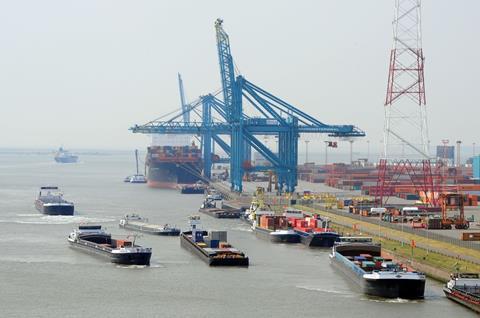Throughput at the port of Antwerp-Bruges was down 5.5 percent in the first six months of 2023 when compared to the same period last year. Despite the weak economic climate, conventional breakbulk volumes are in line with pre-covid levels.

The Belgian gateways handled 139 million tonnes of cargo in the first six months of the year. Nevertheless, in the current unstable economic conditions, the port said it has held up well and is gaining market share in container handling compared to the other ports in the Hamburg – Le Havre range. Antwerp-Bruges stated that its market share has increased by 1 percentage point to 30.6 percent in the first three months of 2023.
Operational challenges and congestion at the container terminals were resolved after two difficult years with deviated cargo returning, the port added.
In terms of breakbulk handling, throughput volumes are in line with the pre-covid period but still down 17.2 percent compared to the same period of 2022. High throughput rates last year were a result of the strong post-covid recovery. Today’s slowing economy is accompanied by a decline in demand for steel – the most important cargo group within this segment at the port. Steel throughput, both import and export, decreased in total by 18 percent.
Ro-ro handling
Ro-ro traffic, meanwhile, is continuing to perform strongly, with the automotive sector demonstrating a 15 percent increase compared to 2022. In the first six months of 2023, throughput of transport equipment grew by 3.6 percent, while unaccompanied freight (excluding containers) fell by 2.1 percent.
Jacques Vandermeiren, ceo of the port of Antwerp-Bruges, said: “As with other world ports, the economic situation is still posing major challenges, and this is reflected in the figures. But in these volatile conditions, the port is holding up relatively well.
“What the second half of the year will bring, depends on many uncertain factors, including energy prices, which have a major impact on the chemical sector. It is at least hopeful that scheduled services that were discontinued because of Covid-19 are now being restarted, and shipping companies are choosing our port as their first port of call.”
As HLPFI reported in its May/June 2023 report on the Benelux region, the high container freight rates and disrupted sailings of last year had a knock-on effect for the port’s multipurpose terminal operators. Marc Van Aken, chief commercial officer at Zuidnatie, noted that during 2022 it handled large volumes of commodities that would normally be shipped via box carriers – “big bags, plywood, steel bars, as well as full and empty containers were being shipped on multipurpose vessels”.
Remaining flexible
Those volumes (both export and import), he said, “affected the availability of free storage areas at our terminals”. He recognised that it is difficult to predict the future of the breakbulk market, commenting: “We simply don’t get any guarantees regarding volumes, and so have to be very flexible during peaks and troughs”. He did, however, note that during the first quarter of 2023, “business went back to normal, with normal volumes of main commodities, i.e. iron, steel and general cargoes”.
Looking ahead, he said: “In my personal opinion, the breakbulk market will become niche very soon. A lot of cargo will be containerised, resulting in less breakbulk cargo. At Zuidnatie, we can rely on long-term partnerships, investments in state-of-the-art infrastructure and sustainable relationships with both our own people and other stakeholders.”
Investments from Zuidnatie include the modernisation of its breakbulk infrastructure as well as the electrification of heavy lift cranes and forklifts. Van Aken was positive regarding current volumes, as well as big heavy lift projects that are in the market for the port of Antwerp and Zuidnatie, starting from the summer of 2023.
Arthur Mahieu, ceo at Rollit Cargo, believes that the project cargo market has held its own, despite the current difficult global situation. He said: “The port of Antwerp is still one of the most important project cargo hubs in the world and consequently generates a lot of exceptional handling.” In addition to renewable energy cargoes, he referenced large projects in the Antwerp chemical and petrochemical sectors as key generators of project cargo traffic. “Both in terms of exports and imports, a lot of cargo passes through the port of Antwerp.”
Read the full Benelux report here.
















